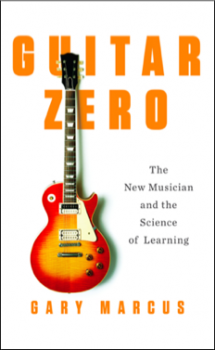Do you have musical talent? Do you wish you did? A small percentage of us seem to have the gift of music but most (if not all) of us wish we had it. Whatever our favorite musical genre is, there is a natural tendency to admire our favorite musicians, listen raptly to the incredible sounds they are able to produce with their voice or their instrument, and to wish or imagine, if only for a moment, that maybe someday we too could produce such melodies.
But to the non-musically inclined, this can seem like an impossible mountain to climb. Music is often thought of as a “gift”, something you are either endowed with or not. When people describe themselves as having “no rhythm” or “no ear for music” or “tone deaf”, they generally think of these things as defining characteristics. They are talents you are either born with or not.
Gary Marcus, a psychology professor at NYU, was one of those poor souls born without a knack for music. But as a psychology professor he was familiar with a variety of research on skill development. Carol Dweck’s research on “Mindset” for example, which shows that people who believe that skill can be developed will be far more successful (evidence supporting the old saw, “whether you believe you can or can’t, you’re right.”) Or Anders Ericsson, who found that what separates the experts from the amateurs (in any field) is about 10,000 hours of deliberate practice.
 Marcus decided to put it to the test in a personal way, and set out to see if a person with no musical talent could become a musician. He’s written a book about his journey, appropriately titled “Guitar Zero,” a reference to both his initial lack of talent and his addiction to the game “Guitar Hero,” which perhaps laid the foundation for his musical journey.
Marcus decided to put it to the test in a personal way, and set out to see if a person with no musical talent could become a musician. He’s written a book about his journey, appropriately titled “Guitar Zero,” a reference to both his initial lack of talent and his addiction to the game “Guitar Hero,” which perhaps laid the foundation for his musical journey.
As you might imagine (because it would not be a very notable book otherwise,) Marcus succeeds in his quest to become a guitarist. But for anyone with a budding interest in music, his book is worth reading to see some of the conclusions he makes along the way.
The most important lesson of course, is that this kind of change is possible. We can become something we aren’t. We can change who we are. Talent can be cultivated.
I personally learned this powerful lesson as an awkward, bookish teenager, when I intentionally chose to become an athlete, and joined my high school swim team. That decision, and the subsequent transformation in my life, paved the way for me to pursue a great number of other successes including two black belts (in Hapkido and Tang Soo Do), learning to Salsa Dance, and even learning how to play the guitar. Carol Dweck is right. Once you believe change is possible, the world is your oyster.
But it’s not easy.
My motto now is, “you can have anything you want, you just can’t have everything you want.” It takes hard work and sacrifice. It’s not just 10,000 hours, it’s 10,000 hours of intense, concentrated, repetitive, rigorous practice that creates expertise. As one of my old coaches used to say, “practice doesn’t make perfect, perfect practice makes perfect!”
Want to become a guitarist? A novelist? A motivational speaker? An elite athlete? A neurosurgeon? You can do any of the above, as long as you are willing to sacrifice many other things in your life to get there.
It’s not that talent doesn’t play a role at all. (See a critique of Ericsson’s 10,000 hours theory here.) Marcus pooh-poohs the simplicity of Malcolm Gladwell’s “Outliers” where he describes elite performance as the outcome of 1. extensive practice and 2.luck. Marcus notes that not all musicians develop the same way. Maybe some have a flair for finger speed, while others may have a unique ear for finding different kinds of harmonies.
Anyone can learn music. But having natural talent means you might pick things up quicker, or you might be able to go farther with your skills. Marcus cites an often overlooked study by Edwin Gordon, showing that talent predicted about half the variability in musical skill development in a group of students after three years of studying.
Anyone can become a musician. Not anyone can become the best musician. The good news is, you don’t have to be Paul McCartney to enjoy making music. Pick up a guitar, or a harmonica, or a microphone and start with 15 minutes a day of deliberate practice. For Marcus, myself, and countless others, playing music is not about becoming the next Jimi Hendrix. It’s about finding flow and simply enjoying life.
—
References and recommended reading:
Dweck, C. (2007). Mindset: The New Psychology of Success. Ballantine Books.
Gladwell, M. (2008). Outliers: The Story of Success. Little, Brown and Company.
Marcus, G. (2012). Guitar Zero: The New Musician and the Science of Learning. The Penguin Press HC.
by Jeremy McCarthy
Connect with me on facebook, twitter, or pinterest.



I think this is truly wonderful. I remember doing something similar, though not nearly as grandiose, when I was in high school, flunking drama (which I always loved but was never good at). My teacher basically told me that I had to be less shy, and when I got my report card and my marks were quite low, I just resolved to be less shy and just do the stupid dramatic stuff already. My marks improved, as did my faith in myself.
I never went on to any greatness in drama, but it did help in my entire career that I just “put it out there” – speaking, teaching, consulting, running workshops. I can definitely trace back some confidence and success to my grade 11 decision to be better at drama – and “just do it”. Thanks for the reminder that we all have this in us!
thank you for the post. As a psychologist I have always told my patients that there were only two ways to effect change: you can change the way you act by changing the way you think (the long method) or you can change the way you think by changing the way you act (the short method).
Great stuff! Thanks Jeremy.
Since you asked for it (albeit unconsciously), here is a link to my “new” CD. Gladwell is correct. I have easily spent 10,000 hours playing the guitar. Now, if I could just get to 10,000 hours of applying positive psychology…
http://www.cdbaby.com/cd/thewasabi
This post really hit home for me, and I have a story to share.
I’m a musician myself…I started on guitar at a very young age, and thus became “naturally good at it”. However that wasn’t enough for me…I wanted to write songs and sing.
So I struggled for many years with my voice, but I loved singing so much and despite lots of non-approval, I eventually have come into my own voice, and get great compliments on it now.
Guitar was my “natural” talent and singing wasn’t, but now both are on par, because I persevered in singing and would not give up. And because of that, when I hit those money notes…they are so fulfilling!
Thanks all for sharing your comments and stories. I think there are few things more powerful than realizing that you can become good at something that you do not consider yourself talented at. The self-efficacy and self-belief that derive from it open so many other doors!
Nice Post Mr.J
Sandra, your post supports my talks about why most psychologist are detrimental to their clients Mental Health.
Cheers